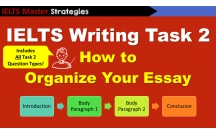
Home
Học tiếng Anh
Luyện thi IELTS
IELTS Writing task 2 - chủ đề chủ đề electronic and computer games
IELTS Writing task 2 - chủ đề chủ đề electronic and computer games
Đ thi IELTS Writing task 2 ngày 17/12/2016ề
Some people say that young people learn useful skills by playing electronic and computer
games. Others say that young people who play electronic and computer games are wasting
their time.
Discuss both views and give your opinion
Phân tích đ bàiề
– Keywords: electronic and computer games.
– Micro-keywords: young people, useful skills, wasting time.
– Action keywords: discuss and give opinion.
Có th th y, đây là bài vi tể ấ ế d ng Discussion Essayạ – d ng đ a kèm ý ki n cá nhân, nghĩa là ạ ư ế
ngoài vi c th o lu n, đánh giá các ý ki n trái chi u ph n đ bài ra, b n còn ph i đ a thêm ýệ ả ậ ế ề ở ầ ề ạ ả ư
ki n c a b n thân n a.ế ủ ả ữ
C u trúc bài vi tấ ế
Introduction:
V i câu m đ u, b n hãyớ ở ầ ạ paraphrase l i t v ngạ ừ ự trong topic, nêu ra 2 m t c a vi c ặ ủ ệ
ch i game.ơ
Sang câu th 2, tr l i câu h iứ ả ờ ỏ s d ng đ i t nhân x ng ngôi th nh tử ụ ạ ừ ư ứ ấ đ làm rõ ý ể
ki n b n thân (nghiêng v lu ng ý ki n nào?)ế ả ề ồ ế
Body 1:
Topic sentence: M t m t, m t s ng i tin r ng ch i game có th tăng m t s k năngộ ặ ộ ố ườ ằ ơ ể ộ ố ỹ
nh gi i quy t v n đ , s c m nh nh n th c, s t p trung và kh năng đ nh h ng.ư ả ế ấ ề ứ ạ ậ ứ ự ậ ả ị ướ
Supporting idea 1: Khi tham gia vào game nh p vai, h đ c yêu c u đóng gi nhân ậ ọ ượ ầ ả
v t theo gi l p trong game khi n h nâng cao nhi u kh năng.ậ ả ậ ế ọ ề ả
Supporting idea 2: Ch i game tăng đ nh y không gian vì có nhi u game đ c gi l p ơ ộ ạ ề ượ ả ậ
d ng 3D, game th còn x lí thông tin nhanh h n.ạ ủ ử ơ
Body 2:
Topic sentence: M t khác, tôi tin r ng m i ng i đang lãng phí th i gian vô ích vào ặ ằ ọ ườ ờ
game.
Supporting idea 1: Nh ng k năng chúng ta h c đ c t game không giúp gì trong cu cữ ỹ ọ ượ ừ ộ
s ng.ố
Supporting idea 2: Máy tính và game online có tính gây nghi n r t cao và n u dành càngệ ấ ế
nhi u th i gian ch i thì càng ít th i gian h c t p, giao l u v i th gi i bên ngoài d n t i ề ờ ơ ờ ọ ậ ư ớ ế ớ ẫ ớ
d b cô l p.ễ ị ậ
Conclusion: T ng k t câu h i, đ a ý ki n b n thân và ch gói g n trong 1 câu đổ ế ỏ ư ế ả ỉ ọ ể đ m b o ả ả
tính ng n g n nh ng ch t l ng và nhanh chóngắ ọ ư ấ ượ c a ph n k t lu n.ủ ầ ế ậ
Gi i đ thi IELTS Writing task 2 ngày 17/12/2016ả ề
Bài m u tham kh oẫ ả
Thanks to technological advancements, electronic and computer games have burgeoned as one
of the most popular forms of entertainment among young people. While some may embrace the
idea of positive impacts that these games can bring about, I believe that they are no more than a
waste of time.
On the one hand, there are some reasons for the belief that computer games can improve gamers’
skills such as problem-solving, cognitive strengths, attention, spatial orientation and so on. For
example, some experts suggest that when a gamer participates in a role-playing game, they are
required to assume the role of the characters in a fictional setting. This allows them to develop
their cognitive and strategicthinking so that they can handle all situations happening in the
game. Next, an aviation game can sharpen spatial orientation ability as it gets gamers be ready
for the three-dimensional environment of a flight. In addition, because gaming requires hand-
eye co-ordination, gamers are expected to process information faster and their reflex actions can
therefore be quicker than non-gamers.
On the other hand, I am more convinced that young people are squandering their precious time
on immersing in the virtual gaming world because the skills gained from these games are just
useless in real life. Secondly, computer and online games can be highly addictive, for the higher
the level is, the more complicated and extensive it becomes. This is the reason why players are
always forced to put a lot of efforts on gaming if they want to pass the current level and move on
to the next one. Paying too much attention to the world of virtual missions, players are often
socially isolated and usually ignore their real-life tasks such as learning or socializing, which
defines their meaning in this life.
In conclusion, despite some positive impacts of gaming on the development of gamers’ skills, I
still hold the opinion that young people are wasting their time on such form of entertainment.
T v ng hayừ ự
Thanks to: nh cóờ
Ex: thanks to your help
Advancement (v): the process of helping something to make progress or succeed; the
progress that is made – B c ti nướ ế
Ex: the advancement of knowledge/education/science.
Burgeon (adj): b t đ u phát tri nắ ầ ề
Embrace (v): to accept an idea, a proposal, a set of beliefs, etc., especially when it is
done with enthusiasm – Có ý t ng, nghĩ raưở
Ex: It is unlikely that such countries will embrace capitalist ideas.
Impact (n): the powerful effect that something has on somebody/something – nh h ngẢ ưở
Ex: the environmental impact of tourism
Belief (n): a strong feeling that something/somebody exists or is true; confidence that
something/somebody is good or right – Ni m tinề
Ex: belief in God/democracy
Problem-solving (n): the act of finding ways of dealing with problems – Gi i quy t v n ả ế ấ
đề
Ex: to develop problem-solving skills and strategies
Cognitive (adj): connected with mental processes of understanding – Hi u bi t/ thu c ể ế ộ
v trí thông minhề
Ex: a child’s cognitive development
Spatial (adj): relating to space and the position, size, shape, etc. of things in it – Thu c ộ
v không gianề
Ex: changes taking place in the spatial distribution of the population
Role-playing game (n): a game in which players pretend to be imaginary characters
who take part in adventures, especially in situations from fantasy literature – Trò ch i nh p ơ ậ
vai
Ex: Hunger Game is a kind of role-playing game.
Fictional (adj): not real or true; existing only in stories; connected with fiction – oẢ
Ex: Loves between people in the games are usually fictional.
Strategic (adj): done as part of a plan that is meant to achieve a particular purpose or
to gain an advantage – Có chi n l cế ượ
Ex: strategic planning
Three-dimensional (adj): having, or appearing to have, length, width and depth – 3
chi uề
Ex: three-dimensional objects
Hand-eye co-ordination (n): the way that one’s hands and sight work together to be
able to do things that require speed and accuracy (such as catching or hitting a ball) – k ỹ
năng k t h p nhu n nhuy n tay m tế ợ ầ ễ ắ
Ex: an athlete with good hand-eye coordination
Convince (v): to make somebody/yourself believe that something is true – Làm cho tin
t ng/ kh ng đ nhưở ẳ ị
Ex: You’ll need to convince them of your enthusiasm for the job.
Squander (v): to waste money, time, etc. in a stupid or careless way – Tiêu t n, lãng phíố
Ex: The team squandered several good scoring chances.
Immerse (adj): to become or make somebody completely involved in something – Đ m ắ
chìm
Ex: The She immersed herself in her work.
B n d ch ti ng Vi tả ị ế ệ
Nh nh ng ti n b công ngh , trò ch i đi n t và máy tính đã đ c phát tri n nh m t trong ờ ữ ế ộ ệ ơ ệ ử ượ ể ư ộ
nh ng hình th c gi i trí ph bi n nh t trong gi i tr . Trong khi m t s ng i có th nói đi u ữ ứ ả ổ ế ấ ớ ẻ ộ ố ườ ể ề
này đem l i nh ng tác đ ng tích c c, tôi l i cho r ng chúng ch gây t n th i gian.ạ ữ ộ ự ạ ằ ỉ ố ờ
M t m t, m t s ng i có ni m tin r ng trò ch i trên máy tính có th c i thi n các k năng ộ ặ ộ ố ườ ề ằ ơ ể ả ệ ỹ
c a ng i ch i nh gi i quy t v n đ , nâng cao nh n th c, s chú ý, đ nh h ng không gian ủ ườ ơ ư ả ế ấ ề ậ ứ ự ị ướ
và v.v. Ví d , m t s chuyên gia cho r ng khi m t game th tham gia vào m t trò ch i nh p ụ ộ ố ằ ộ ủ ộ ơ ậ
vai, h đ c yêu c u ph i đ m nh n vai trò c a các nhân v t trong m t tình hu ng o. Đi u ọ ượ ầ ả ả ậ ủ ậ ộ ố ả ề
này cho phép h phát tri n t duy nh n th c và chi n l c đ có th x lý t t c các tình ọ ể ư ậ ứ ế ượ ể ể ử ấ ả
hu ng x y ra trong trò ch i. Ti p theo, m t trò ch i hay có th nâng cao kh năng đ nh h ngố ả ơ ế ộ ơ ể ả ị ướ
không gian vì nó khi n game th s n sàng cho môi tr ng ba chi u. Ngoài ra, vì ch i game ế ủ ẵ ườ ề ơ
đòi h i k năng ph i h p tay-m t, game th s t p x lý thông tin nhanh h n và do đó các ỏ ỹ ố ợ ắ ủ ẽ ậ ử ơ
hành đ ng ph n x c a h có th nhanh h n nh ng ng i không ch i game.ộ ả ạ ủ ọ ể ơ ữ ườ ơ
M t khác, tôi tin r ng nh ng ng i tr đang lãng phí th i gian quý báu c a h trong vi c ặ ằ ữ ườ ẻ ờ ủ ọ ệ
đ m mình trong th gi i game o b i vì các k năng thu đ c t nh ng trò ch i này ch là vô ắ ế ớ ả ở ỹ ượ ừ ữ ơ ỉ
d ng trong cu c s ng th c. Th hai, trò ch i tr c tuy n và máy tính có tính gây nghi n r t ụ ộ ố ự ứ ơ ự ế ệ ấ
cao, m c đ càng cao thì càng tr nên ph c t p và r ng h n. Đây là lý do t i sao ng i ch i ứ ộ ở ứ ạ ộ ơ ạ ườ ơ
luôn b bu c ph i đ t r t nhi u n l c vào ch i game n u h mu n v t qua m c hi n t i vàị ộ ả ặ ấ ề ỗ ự ơ ế ọ ố ượ ứ ệ ạ
chuy n sang c p đ ti p theo. Tr ti n và dành quá nhi u s chú ý cho th gi i và các nhi m ể ấ ộ ế ả ề ề ự ế ớ ệ
v o, ng i ch i th ng b cô l p v m t xã h i và th ng b qua các nhi m v th c t ụ ả ườ ơ ườ ị ậ ề ặ ộ ườ ỏ ệ ụ ự ế
c a h nh h c t p ho c giao ti p, xác đ nh ý nghĩa s ng c a mình.ủ ọ ư ọ ậ ặ ế ị ố ủ
Tóm l i, m c dù có m t s tác đ ng tích c c c a vi c ch i game đ i v i s phát tri n k ạ ặ ộ ố ộ ự ủ ệ ơ ố ớ ự ể ỹ
năng c a game th , tôi v n gi quan đi m r ng nh ng ng i tr đang lãng phí th i gian c a ủ ủ ẫ ữ ể ằ ữ ườ ẻ ờ ủ
h vào hình th c gi i trí nh v y.ọ ứ ả ư ậ
có thể bạn quan tâm

IELTS Writing task 2 - chủ đề Family
5
2.849
771
Luyện thi IELTS
5
(New)

IELTS Writing task 2 - chủ đề chủ đề Population
5
2.279
749
Luyện thi IELTS
5
(New)

IELTS Writing task 2 - chủ đề chủ đề economic
4
3.749
691
Luyện thi IELTS
4
(New)

IELTS Writing task 2 - chủ đề chủ đề Advertisements
5
3.220
764
Luyện thi IELTS
5
(New)

IELTS Writing task 2 - chủ đề chủ đề University
5
3.919
776
Luyện thi IELTS
5
(New)

Đề thi IELTS Writing task 2 ngày 28/07/2018
3
1.577
411
Luyện thi IELTS
3
(New)

Tiêu chí chấm thi IELTS Writing task 1
5
3.010
501
Luyện thi IELTS
5
(New)

IELTS Writing task 2 - chủ đề news media
5
3.433
708
Luyện thi IELTS
5
(New)
thông tin tài liệu
IELTS Writing task 2 - chủ đề chủ đề electronic and computer games
Thanks to technological advancements, electronic and computer games have burgeoned as one of the most popular forms of entertainment among young people. While some may embrace the idea of positive impacts that these games can bring about, I believe that they are no more than a waste of time.
Từ vựng hay
• Thanks to: nhờ có
Ex: thanks to your help
• Advancement (v): the process of helping something to make progress or succeed; the progress that is made – Bước tiến
Ex: the advancement of knowledge/education/science.
• Burgeon (adj): bắt đầu phát triền
• Embrace (v): to accept an idea, a proposal, a set of beliefs, etc., especially when it is done with enthusiasm – Có ý tưởng, nghĩ ra
Ex: It is unlikely that such countries will embrace capitalist ideas.
Mở rộng để xem thêm
tài liệu mới trong mục này
tài liệu hot trong mục này
tài liệu giúp tôi
Nếu bạn không tìm thấy tài liệu mình cần có thể gửi yêu cầu ở đây để chúng tôi tìm giúp bạn!
xem nhiều trong tuần
Địa lý 12 Phát triển cây công nghiệp lâu năm Tây Nguyên
Giáo trình Quản trị học của Đại học kinh tế quốc dân
4 đề thi học sinh giỏi Toán lớp 2, có đáp án kèm theo
MẪU GIỚI THIỆU CHUYỂN SINH HOẠT HỘI
Đề thi và lời giải môn xác suất thống kê của trường Học viện ngân hàng
BIỂU MẪU ĐỀ NGHỊ NHẬP KHẨU THUỐC CHƯA CÓ GIẤY ĐĂNG KÝ LƯU HÀNH THUỐC TẠI VIỆT NAM KHÔNG VÌ MỤC ĐÍCH THƯƠNG MẠI
yêu cầu tài liệu
Giúp bạn tìm tài liệu chưa có
×



